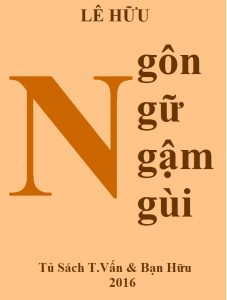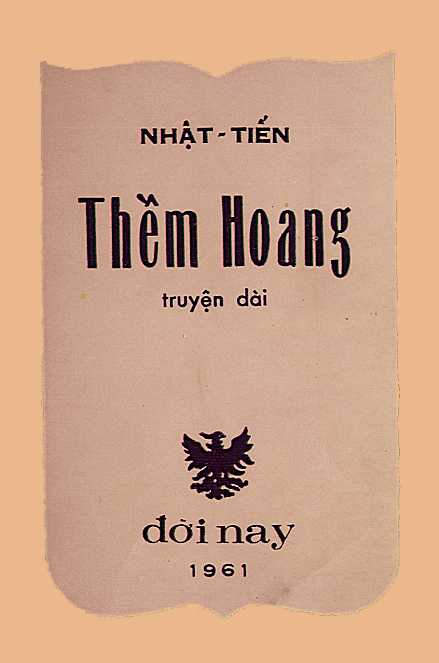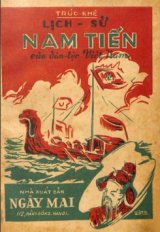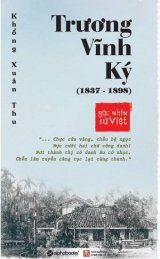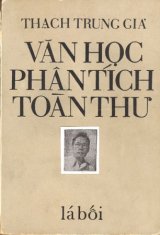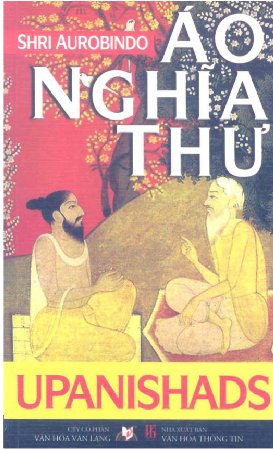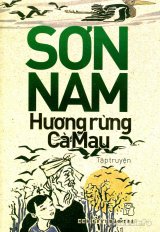|
|
|
|
|
VĂN HỌC |
GIAI THOẠI | TIỂU LUÂN | THƠ | TRUYỆN | THỜI LUẬN | NHÂN VẬT | ÂM NHẠC | HỘI HỌA | KHOA HỌC | GIẢI TRÍ | TIỂU SỬ |
-
Link Tác Phẩm và Tác Giả Tác Phẩm
Tác Giả
Thơ Văn Trần Y. Hoa & Bằng hữu
Thơ Văn Trần Yên Hoà & Bằng hữu
Tạp Chí
PHONG HÓA & NGÀY NAY
(Đại học Hoa Sen)
TỰ LỰC VĂN ĐOÀN, tác phẩm
(Viện Việt Học)
VĂN HỌC
Tạp chí Văn Học
DÒNG VIỆT
Trọn bộ DÒNG VIỆT
(1993-2009)
VĂN (Xuân Canh Thìn)
(vanmagazine)
TIỂU THUYẾT THỨ BẢY
NAM PHONG - TRI TÂN
THANH NGHỊ - NGÀY NAY
VĂN HOÁ NGÀY NAY
TẬP SAN SỬ ĐỊA
THẾ KỶ 21 - BÁCH KHOA
Tạp Chí VHNT Miền Nam
TÂN VĂN
TIN VĂN
Tạp chí ĐỌC VÀ VIẾT
THƯ QUÁN BẢN THẢO
Sách Xưa
• QUỐC VĂN GIÁO KHOA THƯ:
- Lớp Sơ Đẳng
- Lớp Đồng Ấu
- Lớp Dự Bị
• TỦ SÁCH TIẾNG VIỆT
• KHO SÁCH XƯA
• QUÁN VEN ĐƯỜNG
• LITTLE SAIGON
Phim và Hình Ảnh Xưa
- Cuộc Di Cư Năm 1954
- Phim "Chúng Tôi Muốn Sống"
- Phim "Nắng Chiều", 1973
- Phim Chân Trời Tím, 1971
- Hình ảnh xưa
eBooks
-
Tục Ngữ Việt Nam dịch sang Anh Ngữ (Tập san The Vietnam Review) Ad-21 Ad-21 (Google - QC3) (Học Xá)
31-12-2011 | THƠ
Tục Ngữ Việt Nam dịch sang Anh Ngữ
THE VIETNAM REVIEW
Share File.php Share File




 Trúc dẫu cháy đốt ngay vẫn thẳng
Trúc dẫu cháy đốt ngay vẫn thẳng
:: Tre Già Măng Mọc
 In Vietnamese, tre designates any of several species of bamboo
that may grow as tall as 30 meters: its hollow, jointed stems, up to a foot
in diameter, are used in making fumiture and all types of implements
(baskets, coops for chickens and pigs, cooking utensils) and even in
building boats or houses.
In Vietnamese, tre designates any of several species of bamboo
that may grow as tall as 30 meters: its hollow, jointed stems, up to a foot
in diameter, are used in making fumiture and all types of implements
(baskets, coops for chickens and pigs, cooking utensils) and even in
building boats or houses.Bamboo grows from new shoots that sprout from the roots of mature plants: the shoots develop so quickly that, in some cases, a plant is apt to grow 36 inches in 24 hours. Most bamboo plants reach full height within a few months. The tender shoots, called măng, are eaten as vegetables. (The Vietnamese call asparagus măng tây or western shoots'.)
Tre già măng mọc: "As bamboos grow old, young shoots spring up."; Contrary to the generation gap cliché in modern English, the Vietnamese proverb stresses continuity between one generation and the next: it implies the hope that the young will carry on to completion what is left unfinished by the old. When a young person dies, the Vietnamese will express grief saying, Tre khóc măng: "The old bamboo mourns the young shoot."
In neutral terms, the proverb may also be quoted to report a changing of the guard: as a person or group exits a new one moves in and takes over.
:: Đục Nước Béo Cò
 The
English proverbial phrase, to fish in troubled waters, finds its
equivalent in this Vietnamese folk saying: Muddy waters, fat herons.
The
English proverbial phrase, to fish in troubled waters, finds its
equivalent in this Vietnamese folk saying: Muddy waters, fat herons.As wading birds, herons (cò) prey on small fishes that teem in the muddy or turbid (đục) waters (nước) of ponds and rice fields.
A confused state of affairs always gives opportunists a chance to make fat profits at the expense of the community.
:: Trúc dẫu cháy đốt ngay vẫn thẳng
 In Vietnamese, the name trúc refers to a
pecies of small, relatively short species of
bamboo (as contrasted with the much larger
and taller tre).
In Vietnamese, the name trúc refers to a
pecies of small, relatively short species of
bamboo (as contrasted with the much larger
and taller tre). A bamboo stem has knots or nodes, and each section between two knots is called a đốt or joint. Trúc dẫu cháy đốt ngay vẫn thẳng (Even when the bamboo is burned, its straight joints stay straight and true): this proverb portrays an honest person whom neither misfortune nor persecution can divert from what is right. Throughout East Asia, the bamboo symbolizes unswerving devotion to principle.
:: Gà một mẹ đá nhau
Cocks from the same mother fíght each other. This proverb serves as a reminder that fratricidal strife has all too often marked and marred the history of the Vietnamese. The most tragic case was the protracted war between the Trịnh and the Nguyễn. The poet-statesman Nguyễn Trãi (1380-1442) once urged all his compatriots to work together and avoid quarrels either provoked or exacerbated by outsiders:
"A womb's own flesh and bone - strong brotherhood./ From one root spring all branches, north and south./ Chopped off, an arm or leg will not grow back./ Torn up, a shirt or skirt can be replaced./ Learn to give way and yield - all will go well./ Know both when to be hard, when to be soft."
Ad-22-A_Newest-Feb25-2022 Ad-22-A_Newest-Feb25-2022
-
Thơ và bài viết về Thơ (Học Xá) Ad-31 Ad-31 = QC_250-250 (Học Xá) Thơ và Bài viết về Thơ:
Cùng Mục (Link) • Thơ Miền Nam Trong Thời Chiến (Đặng Tiến)
• Quần Đảo Tráo Tên - Chương 4: Hải Lý (Đỗ Quyên)
• Ông Đồ (Vũ Đình Liên)
• Nhớ Mẹ (Đặng Xuân Xuyến)
• Quần Đảo Tráo Tên - Chương 3: Kim Chỉ Nam (Đỗ Quyên)

Ad-33 (Học Xá) Ad-33 - Google - QC4 (Học Xá) Thơ Dịch:
(Vietnamese Poetry translated into English)
 Đàm Trung Pháp & Viên Linh dịch và chú giải:
Đàm Trung Pháp & Viên Linh dịch và chú giải:Vịnh Hai bà Trưng (Hồng Đức Quốc Âm Thi Tập)
Ăn Cỗ Đầu Người (Nguyễn Biểu)
Đoạt Sáo Chương Dương Độ (Trần Quang Khải)
Nam Quốc Sơn Hà (Lý Thường Kiệt)
......
 Huỳnh Sanh Thông dịch:
Huỳnh Sanh Thông dịch:Thăng Long (Nguyễn Du)
Vọng Phu Thạch (Nguyễn Du)
Hồ Hoàn Kiếm (Vô Danh)
(Bà Huyện Thanh Quan)
......
 Lê Đình Nhất-Lang & Nguyễn Tiến Văn dịch:
Lê Đình Nhất-Lang & Nguyễn Tiến Văn dịch:Cùng khổ (Bùi Chát)
Hoa sữa (Bùi Chát)
Bài thơ một vần (Bùi Chát)
......
 Các tác giả khác dịch:
Các tác giả khác dịch:Tôi đã cố bám lấy đất nước tôi (Nguyễn Đình Toàn) (Do Dinh Tuan dịch)
Bữa Tiệc Hòa Bình (Nguyễn Thị Thanh Bình) (Nguyễn Ngọc Bích dịch)
Từ Một Cuốn Rún (Nguyễn Thị Thanh Bình) (Đinh Từ Bích Thúy dịch)
Ad-31 Ad-31 = QC_250-250 (Học Xá) Thơ Cổ:
Cùng Mục & Chỉ Số (Link) • Sau đúng 60 năm, đọc lại bài thơ trừ tịch của Đặng Đức Siêu và Đông Hồ (Trần Từ Mai )
• Mùa Thu Trong Đường Thi (Lê Đình Thông)
• Những Vần Thơ Xuân Của Vua Trần Nhân Tông (Tạ Quốc Tuấn)
• Về một bài thơ dạy học vào mùa xuân của Trần Quý Cáp (Ngô Thời Đôn)
• Cảnh Đẹp Thành Thăng Long Thời Tây Sơn Qua Thi Ca Đoàn Nguyễn Tuấn (Phạm Trọng Chánh)

Ngày Xuân Đọc "Đào Hoa Thi" của Nguyễn Trãi (Trần Uyên Thi)
Thơ Lý Bạch (Đàm Trung Pháp)
Thơ Tuyển:
Cùng Mục & Chỉ Số (Link) • Quần Đảo Tráo Tên - Chương 4: Hải Lý (Đỗ Quyên)
• Ông Đồ (Vũ Đình Liên)
• Nhớ Mẹ (Đặng Xuân Xuyến)
• Quần Đảo Tráo Tên - Chương 3: Kim Chỉ Nam (Đỗ Quyên)
• Không Còn Nữa.. SaiGon (MH Hoài Linh Phương)

Ad-31 Ad-31 = QC_250-250 (Học Xá) Trang Thơ các Tác Giả:
Cùng Chỉ Số - Lưu Trữ (Link)  Chu Ngạn Thư
Chu Ngạn Thư  Chu Trầm Nguyên Minh
Chu Trầm Nguyên Minh  Hạ Đình Thao
Hạ Đình Thao  Hồ Minh Dũng
Hồ Minh Dũng  Hoàng Anh Tuấn
Hoàng Anh Tuấn  Hoàng Hương Trang
Hoàng Hương Trang  Huỳnh Liễu-Ngạn
Huỳnh Liễu-Ngạn  Lê Hữu Nghĩa
Lê Hữu Nghĩa  Lê Phương Nguyên
Lê Phương Nguyên  Lê Văn Trung
Lê Văn Trung 
DANH NGÔN (Proverbs)
• Chí Khí
• Xử Thế
TỤC NGỮ (Proverbs)
• Trúc dẫu cháy đốt ngay vẫn thẳng
ĐỐ VUI (Puzzles)
Ad-31 Ad-31 = QC_250-250 (Học Xá)
|
© Hoc Xá 2002 (T.V. Phê - phevtran@gmail.com) |




